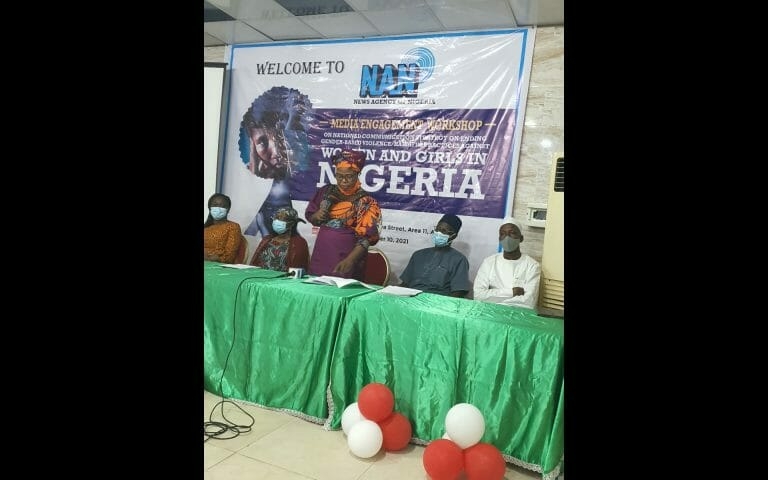The Minister of Women Affairs, Pauline Tallen, has tasked media practitioners to embark on coordinated and integrated effort toward ending the menace of Gender-Based Violence (GBV) in the country.
She gave the advice in Abuja when she declared the News Agency of Nigeria (NAN) Media Engagement workshop on National Communication Strategy on Ending Gender-Based Violence (GBV) and Harmful Practices (HPs) Against Women and Girls in Nigeria.
The minister, who was represented by Mrs Victoria Lar, a Director in the ministry, said that the overall objective of the strategy was to strengthen Government institutions toward addressing GBV.
“The overall objective of the strategy is to strengthen government wide approaches, identify, coordinate, integrate and leverage on current efforts and resources to address Gender Based Violence in a holistic, efficient and effective manner.” she noted
Tallen, who reiterated the imperative of ending GBV, noted that the strategy was a call to action for media practitioners to respond effectively to issues concerning the menace.


According to her, the strategy meeting sets forth concrete goals and actions to be implemented with monitoring and evaluation mechanisms, put in place over the next three years.
She expressed the commitment of the President Muhammadu Buhari-led Federal Government to end GBV by enforcing fundamental human rights.
The minister also emphasised Federal Government’s determination to promote gender equality and empowerment of women and girls as catalyst in addressing the problems of patriarchy and gender stereotyping.
Tallen, who decried the level of violence against women and girls, stated that discrimination and violence against women was alarming.
“The rate of Gender Based Violence against women and girls affects the entire communities, women and girls, men and boys differently, no one is immune to this”
“The spike, pattern, trends and the consequences of these forms of violence impact negatively on individuals, families, communities and the country in general”
“Violence against women and girls, gender inequality, patriarchy and harmful cultural practices significantly inhibit women’s potential to fully contribute their quota and participate in national development.” She said.
She, however, expressed satisfaction over the interest of states to domesticate and implement the Violence Against Persons Prohibition (VAPP) Act 2015.
The Managing Director of the News Agency of Nigeria (NAN), Buki Ponle, described violence against women and girls as the most common human rights violations in the world, with an estimated one in three women experiencing physical or sexual abuse at some point in their lives.
Ponle, who was represented by the agency’s Director of Finance and Account, Mr Dele Ojo, regretted that GBV and other harmful practices had become regular features in many homes.
“This is manifested in rampant instances of physical violence, Female Genital Mutilation, forced marriage, sexual violence, including rape, as well as sexual harassment, among others”
“At a time, the country has continued to witness a surge in cases of GBV and harmful cultural practices”
“Engaging the media in ending this scourge through a workshop such as this could not have come at a better time” he said.
The NAN boss commended the UN Population Fund (UNFPA) for initiating the workshop and the Centre for Communication and Social Impact (CCSI) for facilitating it and the EU-UN Spotlight Initiative project for funding it.
Ponle, who said that the media was critical in the effort to end GBV and other harmful practices, lauded the Federal Government’s commitment to ending the scourge.
Hajiya Kori Habib, the Media Associate, UNFPA, reiterated the UN’s commitment to zero tolerance for Gender Based Violence.
Habib stressed that UN was targeting 2030 as the year to finally eliminate Gender Based Violence.
“It is important to focus on the issues, see where the lapses are and how the media can be better engaged to support efforts to end GBV in Nigeria.” she said
The News Agency of Nigeria (NAN) reports that the media engagement on ending GBV and other harmful practices was organised by NAN, in collaboration with UNFPA and Centre for Communication and Social Impact (CCSI), with funding from the EU-UN Spotlight Initiative project.

















Discussion about this post